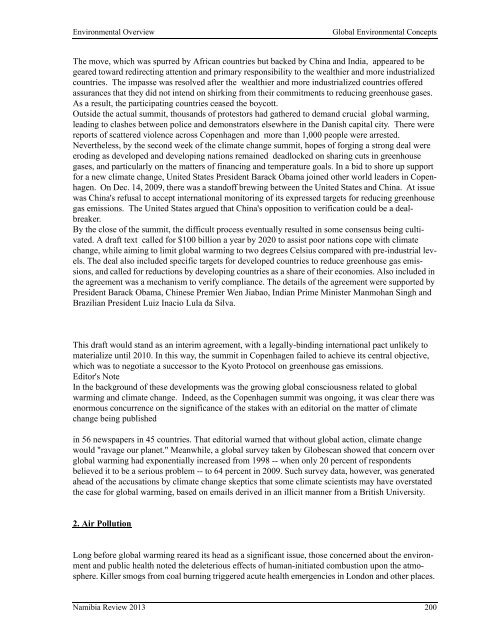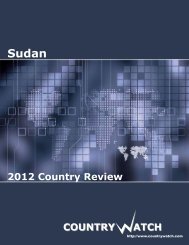Namibia - CountryWatch
Namibia - CountryWatch
Namibia - CountryWatch
Create successful ePaper yourself
Turn your PDF publications into a flip-book with our unique Google optimized e-Paper software.
Environmental Overview Global Environmental Concepts<br />
The move, which was spurred by African countries but backed by China and India, appeared to be<br />
geared toward redirecting attention and primary responsibility to the wealthier and more industrialized<br />
countries. The impasse was resolved after the wealthier and more industrialized countries offered<br />
assurances that they did not intend on shirking from their commitments to reducing greenhouse gases.<br />
As a result, the participating countries ceased the boycott.<br />
Outside the actual summit, thousands of protestors had gathered to demand crucial global warming,<br />
leading to clashes between police and demonstrators elsewhere in the Danish capital city. There were<br />
reports of scattered violence across Copenhagen and more than 1,000 people were arrested.<br />
Nevertheless, by the second week of the climate change summit, hopes of forging a strong deal were<br />
eroding as developed and developing nations remained deadlocked on sharing cuts in greenhouse<br />
gases, and particularly on the matters of financing and temperature goals. In a bid to shore up support<br />
for a new climate change, United States President Barack Obama joined other world leaders in Copenhagen.<br />
On Dec. 14, 2009, there was a standoff brewing between the United States and China. At issue<br />
was China's refusal to accept international monitoring of its expressed targets for reducing greenhouse<br />
gas emissions. The United States argued that China's opposition to verification could be a dealbreaker.<br />
By the close of the summit, the difficult process eventually resulted in some consensus being cultivated.<br />
A draft text called for $100 billion a year by 2020 to assist poor nations cope with climate<br />
change, while aiming to limit global warming to two degrees Celsius compared with pre-industrial levels.<br />
The deal also included specific targets for developed countries to reduce greenhouse gas emissions,<br />
and called for reductions by developing countries as a share of their economies. Also included in<br />
the agreement was a mechanism to verify compliance. The details of the agreement were supported by<br />
President Barack Obama, Chinese Premier Wen Jiabao, Indian Prime Minister Manmohan Singh and<br />
Brazilian President Luiz Inacio Lula da Silva.<br />
This draft would stand as an interim agreement, with a legally-binding international pact unlikely to<br />
materialize until 2010. In this way, the summit in Copenhagen failed to achieve its central objective,<br />
which was to negotiate a successor to the Kyoto Protocol on greenhouse gas emissions.<br />
Editor's Note<br />
In the background of these developments was the growing global consciousness related to global<br />
warming and climate change. Indeed, as the Copenhagen summit was ongoing, it was clear there was<br />
enormous concurrence on the significance of the stakes with an editorial on the matter of climate<br />
change being published<br />
in 56 newspapers in 45 countries. That editorial warned that without global action, climate change<br />
would "ravage our planet." Meanwhile, a global survey taken by Globescan showed that concern over<br />
global warming had exponentially increased from 1998 -- when only 20 percent of respondents<br />
believed it to be a serious problem -- to 64 percent in 2009. Such survey data, however, was generated<br />
ahead of the accusations by climate change skeptics that some climate scientists may have overstated<br />
the case for global warming, based on emails derived in an illicit manner from a British University.<br />
2. Air Pollution<br />
Long before global warming reared its head as a significant issue, those concerned about the environment<br />
and public health noted the deleterious effects of human-initiated combustion upon the atmosphere.<br />
Killer smogs from coal burning triggered acute health emergencies in London and other places.<br />
<strong>Namibia</strong> Review 2013 200




